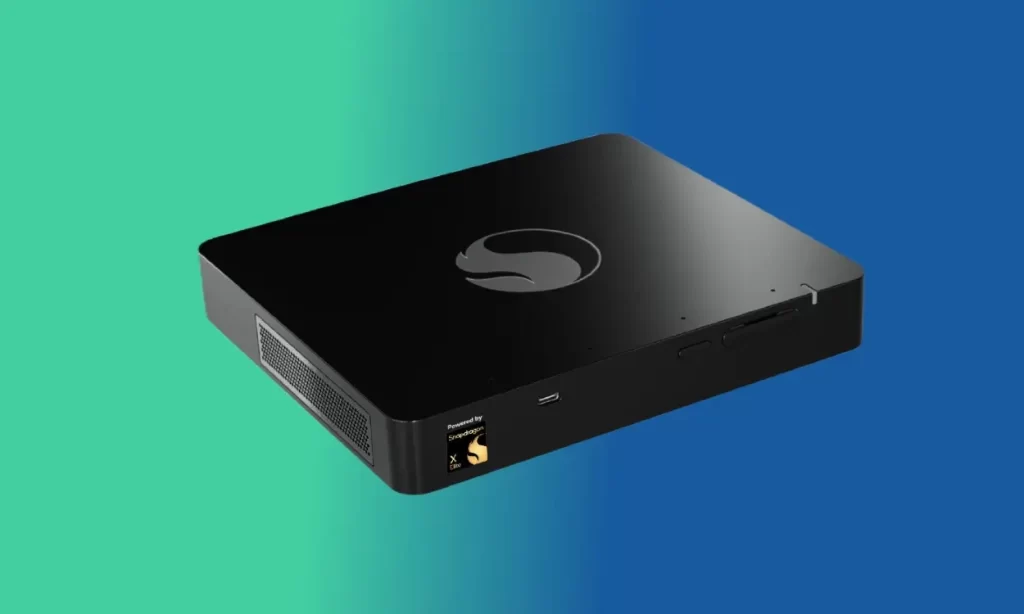Qualcomm has made the surprising decision to cancel its Snapdragon Dev Kit, a mini PC designed to run Windows on ARM. Initially unveiled earlier this year with plans for a June release alongside the first Copilot Plus PCs, the mini PC was intended to be a significant player in the Windows on ARM ecosystem. However, Qualcomm announced that the device did not meet the company’s high standards of quality, prompting a refund offer for those who had pre-ordered.
Background on the Snapdragon Dev Kit
The Snapdragon Dev Kit was designed to showcase the capabilities of Qualcomm’s Snapdragon X Elite chipset, which has already found a home in some of the year’s most impressive Windows laptops. This chipset was expected to bring enhanced performance and efficiency, making it a compelling option for developers and users alike. However, despite initial enthusiasm, the mini PC faced significant delays and challenges that ultimately led to its cancellation.
Struggles with Development
Reports indicate that Qualcomm struggled to ship the Snapdragon X Elite-powered Windows on ARM mini PC for several months. In an email sent to customers, Qualcomm admitted that the device fell short of its usual standards of excellence. While the specifics surrounding the device’s shortcomings were not detailed, the company’s decision to halt its production suggests substantial issues that could not be overlooked.
User Feedback and Reception
Some users who managed to get their hands on the Snapdragon Dev Kit have provided feedback on its performance. Notably, developer Jeff Geerling commented that the mini PC performed similarly to Apple’s M3 Pro chipset. However, he pointed out critical limitations that hindered its appeal, such as the lack of Linux support and restrictions on reselling the device. These factors contributed to a less-than-stellar reception among potential users.
One of the more notable issues raised by Geerling pertains to the absence of an HDMI port, which was initially slated to be included in the final product. This missing feature likely diminished the device’s utility for developers and consumers who required versatile connectivity options. The HDMI port’s omission highlights a failure in meeting user expectations, which may have played a role in Qualcomm’s decision to scrap the mini PC.
The Snapdragon X Elite Processor
The Snapdragon Dev Kit was powered by the Snapdragon X Elite X1E-00-1DE, a chip that offers performance enhancements over its predecessors. This processor was designed to provide superior speed and efficiency, ideally suited for running demanding applications on Windows. However, even with its impressive specs, the mini PC struggled to capture interest, largely due to its limitations and the challenges faced during development.
Implications for the Windows on ARM Ecosystem
Despite the cancellation of the Snapdragon Dev Kit, Qualcomm remains committed to the Windows on ARM platform. The company has indicated that several Snapdragon X Elite-powered Windows PCs will be released in various form factors in the coming months, though these will not be produced or sold by Qualcomm directly. This move underscores Qualcomm’s continued investment in the ARM architecture and its potential to enhance the Windows ecosystem.
Microsoft and Qualcomm have been actively encouraging developers to port their applications to Windows on ARM, with the Snapdragon Dev Kit positioned as a vital tool in this effort. Its cancellation, however, raises questions about the ongoing viability and support for Windows on ARM, particularly given the challenges presented by hardware limitations.
The Future of Qualcomm and Windows on ARM
Qualcomm’s decision to cancel the Snapdragon Dev Kit may prompt a reassessment of its approach to the Windows on ARM market. With significant investments in developing powerful chipsets like the Snapdragon X Elite, Qualcomm needs to ensure that its hardware aligns with user expectations and offers the features necessary for widespread adoption.
The future of Windows on ARM appears to hinge on the success of upcoming devices powered by the Snapdragon X Elite chipset. As manufacturers prepare to launch these products, Qualcomm must focus on refining its hardware and ensuring compatibility with the software developers are eager to bring to the platform.
Market Competitiveness
The competition in the mini PC and ARM-based market is fierce, with several companies vying for a share. Apple’s M1 and M3 chips have set high performance standards, prompting Qualcomm to step up its game. The Snapdragon X Elite represents an essential step in this direction, but without a robust hardware offering like the Dev Kit, Qualcomm risks falling behind in an increasingly competitive landscape.
Additionally, with many developers and users becoming accustomed to traditional x86 architecture, the road to acceptance for Windows on ARM may be more challenging. Qualcomm’s cancellation of the Dev Kit may highlight the need for better education and marketing around the benefits of ARM-based systems, particularly in terms of efficiency, performance, and versatility.
Conclusion
Qualcomm’s cancellation of the Snapdragon Dev Kit is a notable development in the tech world, particularly for those invested in the Windows on ARM ecosystem. The decision reflects a commitment to quality and user satisfaction but raises questions about the future of ARM-based Windows devices. As Qualcomm prepares to launch additional Snapdragon X Elite-powered PCs, it must ensure these products meet the high expectations of consumers and developers alike.
The cancellation serves as a reminder that in the fast-evolving world of technology, meeting consumer needs and maintaining rigorous standards is crucial for success. While Qualcomm remains optimistic about its ARM offerings, the tech community will be watching closely to see how the company addresses these challenges moving forward.

